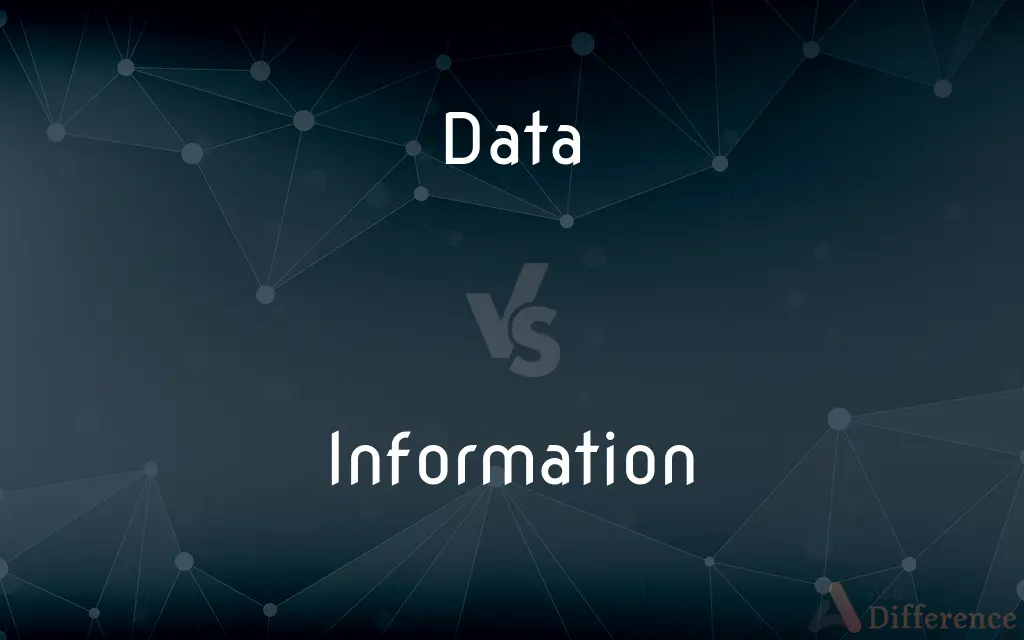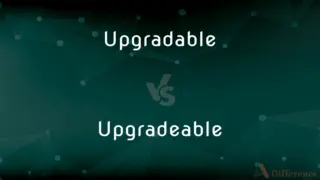Data vs. Information — What's the Difference?
By Tayyaba Rehman — Updated on September 26, 2023
Data are raw facts or details without context, while information is data that is processed or organized such that it has meaning.

Difference Between Data and Information
Table of Contents
ADVERTISEMENT
Key Differences
Data represents raw facts, figures, or details without applied context, and it forms the building blocks of information. On the other hand, information is what we obtain when data is processed, interpreted, organized, structured, or presented in a given context to make it understandable, relevant, and useful.
When considering the utility of data and information, data in its raw form may lack meaning and may not lead to a correct understanding or interpretation. In contrast, information is processed data that provides clearer insights, enabling better decision-making and understanding.
Another perspective to look at data and information is through their transformative journey. Data is like the raw material, the unprocessed detail which when analyzed, refined, and interpreted, turns into meaningful information, which is richer and more useful in context.
In terms of value, data alone might not be very valuable, as it doesn't contribute to understanding or knowledge in its raw form. However, when data is converted into information, it gains significance, becomes relevant, and acquires the power to inform, educate, and facilitate knowledge.
Structurally, data can be scattered, unorganized, and may appear as random bits and pieces of facts, often numerical. Information, conversely, is well-organized, structured, and presented data that is qualitative or quantitative and interpretable by individuals or systems.
ADVERTISEMENT
Comparison Chart
Form
Raw, unprocessed facts, and figures
Processed, organized, and structured data
Meaning
Lacks context and meaning
Has meaning and context, providing clarity and understanding
Utility
Limited usefulness due to lack of context
Useful for insights, decision-making, and knowledge
Value
Less valuable in its raw state
Gains value when processed and interpreted
Structure
Can be scattered and unorganized
Well-organized, structured, and presented
Compare with Definitions
Data
Data serves as the basis for information creation.
The gathered data were processed to extract meaningful information.
Information
Information is structured, organized, and presented for understanding.
The information was outlined clearly in the document.
Data
Data can be represented in various forms like text, numbers, images.
The data were presented in tables, graphs, and text.
Information
Information is processed data that has meaning and context.
The report provided valuable information about the market trends.
Data
Data is raw, unprocessed facts and figures without context.
The researcher collected ample data during the experiment.
Information
Information is derived from the interpretation and analysis of data.
The analysis converted the raw data into useful information.
Data
Data can be qualitative or quantitative.
The data included both numerical and categorical variables.
Information
Information can be thought of as the resolution of uncertainty; it answers the question of "What an entity is" and thus defines both its essence and the nature of its characteristics. The concept of information has different meanings in different contexts.
Data
Data, in its raw form, may lack inherent meaning.
The sheer volume of data made it challenging to discern any patterns.
Information
Knowledge or facts learned, especially about a certain subject or event.
Data
Data are units of information, often numeric, that are collected through observation. In a more technical sense, data are a set of values of qualitative or quantitative variables about one or more persons or objects, while a datum (singular of data) is a single value of a single variable.Although the terms "data" and "information" are often used interchangeably, these terms have distinct meanings.
Information
The act of informing or the condition of being informed; communication of knowledge
Safety instructions are provided for the information of our passengers.
Data
Plural of datum
Information
(Computers) Processed, stored, or transmitted data.
Data
Information, especially in a scientific or computational context, or with the implication that it is organized.
The raw information was processed and placed into a database so the data could be accessed more quickly.
Information
A numerical measure of the uncertainty of an experimental outcome.
Data
(collectively) Recorded observations that are usually presented in a structured format.
Information
(Law) A formal accusation of a crime made by a public officer rather than by grand jury indictment in instances in which the offense, if a federal crime, is not a felony or in which the offense, if a state crime, is allowed prosecution in that manner rather than by indictment.
Data
(computing) A representation of facts or ideas in a formalized manner capable of being communicated or manipulated by some process.
Information
That which resolves uncertainty; anything that answers the question of "what a given entity is".
Data
Senseid|en|telephony}}(mobile telephony) {{ellipsis of mobile data: digital information transmitted using the cellular telephone network rather than Wi-Fi.
Run out of data
Information
Things that are or can be known about a given topic; communicable knowledge of something.
I need some more information about this issue.
Data
See Datum.
Information
The act of informing or imparting knowledge; notification.
For your information, I did this because I wanted to.
Data
A collection of facts, observations, or other information related to a particular question or problem; as, the historical data show that the budget deficit is only a small factor in determining interest rates.
Information
A statement of criminal activity brought before a judge or magistrate; in the UK, used to inform a magistrate of an offence and request a warrant; in the US, an accusation brought before a judge without a grand jury indictment.
Data
Information, most commonly in the form of a series of binary digits, stored on a physical storage medium for manipulation by a computer program. It is contrasted with the program which is a series of instructions used by the central processing unit of a computer to manipulate the data. In some conputers data and execuatble programs are stored in separate locations.
Information
(obsolete) The act of informing against someone, passing on incriminating knowledge; accusation.
Data
A collection of facts from which conclusions may be drawn;
Statistical data
Information
The systematic imparting of knowledge; education, training.
Information
The creation of form; the imparting of a given quality or characteristic; forming, animation.
Information
[…] the meaning that a human assigns to data by means of the known conventions used in its representation.
Information
(Christianity) Divine inspiration.
Information
A service provided by telephone which provides listed telephone numbers of a subscriber.
Information
(information theory) Any unambiguous abstract data, the smallest possible unit being the bit.
Information
As contrasted with data, information is processed to extract relevant data.
Information
(information technology) Any ordered sequence of symbols (or signals) (that could contain a message).
Information
The act of informing, or communicating knowledge or intelligence.
The active informations of the intellect.
Information
Any fact or set of facts, knowledge, news, or advice, whether communicated by others or obtained by personal study and investigation; any datum that reduces uncertainty about the state of any part of the world; intelligence; knowledge derived from reading, observation, or instruction.
Larger opportunities of information.
He should get some information in the subject he intends to handle.
Information
A proceeding in the nature of a prosecution for some offense against the government, instituted and prosecuted, really or nominally, by some authorized public officer on behalf of the government. It differs from an indictment in criminal cases chiefly in not being based on the finding of a grand jury. See Indictment.
Information
A measure of the number of possible choices of messages contained in a symbol, signal, transmitted message, or other information-bearing object; it is usually quantified as the negative logarithm of the number of allowed symbols that could be contained in the message; for logarithms to the base 2, the measure corresponds to the unit of information, the hartley, which is log210, or 3.323 bits; called also information content. The smallest unit of information that can be contained or transmitted is the bit, corresponding to a yes-or-no decision.
Information
Useful facts, as contrasted with raw data; as, among all this data, there must be some interesting information.
Information
A message received and understood
Information
A collection of facts from which conclusions may be drawn;
Statistical data
Information
Knowledge acquired through study or experience or instruction
Information
(communication theory) a numerical measure of the uncertainty of an outcome;
The signal contained thousands of bits of information
Information
Formal accusation of a crime
Information
Information is essential for making informed decisions.
The manager used the information to devise a new strategy.
Information
Information conveys knowledge, facilitating learning and understanding.
The students used the information to enhance their knowledge of the subject.
Common Curiosities
Is data always numerical?
No, data can be both numerical (quantitative) and non-numerical (qualitative).
Can information exist without data?
No, information cannot exist without data as information is derived from processed and interpreted data.
Is data more valuable than information?
Typically, information is more valuable than raw data as it provides context, meaning, and insights, aiding in decision-making and understanding.
How is information derived from data?
Information is derived from data through processes like analysis, interpretation, and organization, which provide context and meaning to raw data.
Is information always accurate?
No, information may not always be accurate; its accuracy depends on the correctness and reliability of the underlying data and the processing methods.
Can information be unorganized?
Typically, information is organized and structured data, presented in a manner that conveys meaning and understanding.
Can data exist without information?
Yes, data can exist as raw, unprocessed facts without being converted into meaningful information.
How can data be represented?
Data can be represented in various forms, such as text, numbers, images, graphs, or tables.
Is all data converted to information?
No, not all data is converted to information; some data may remain unprocessed and not used to derive meaningful insights.
Can data in itself aid in decision-making?
Data in its raw form may not aid in decision-making, but when processed and converted to information, it becomes crucial for making informed decisions.
Is information only derived from processed data?
Yes, information is specifically the result of processing and interpreting raw data to provide context and meaning.
How does information contribute to knowledge?
Information contributes to knowledge by providing meaningful and contextual insights, facilitating learning and understanding.
Can data be structured?
Yes, while data can be raw and unorganized, it can also be structured, particularly when organized in databases or tables.
Can data be qualitative?
Yes, data can be qualitative, representing non-numerical attributes, characteristics, or properties.
Does data always lack context?
Raw data typically lacks context and meaning until it is processed and interpreted to become information.
Share Your Discovery

Previous Comparison
Floccillation vs. Carphologia
Next Comparison
Upgradable vs. UpgradeableAuthor Spotlight
Written by
Tayyaba RehmanTayyaba Rehman is a distinguished writer, currently serving as a primary contributor to askdifference.com. As a researcher in semantics and etymology, Tayyaba's passion for the complexity of languages and their distinctions has found a perfect home on the platform. Tayyaba delves into the intricacies of language, distinguishing between commonly confused words and phrases, thereby providing clarity for readers worldwide.
















































